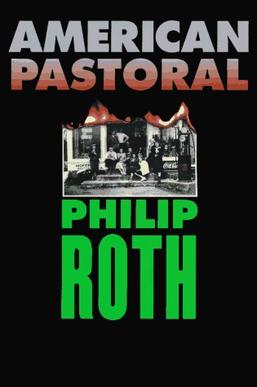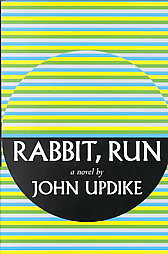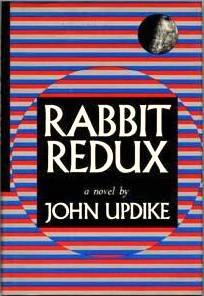Redux is a postpositive adjective meaning 'brought back, restored' (from Latin reducere, 'to bring back') [1] used in literature, film and video game titles.
Redux is a postpositive adjective meaning 'brought back, restored' (from Latin reducere, 'to bring back') [1] used in literature, film and video game titles.
Works of literature using the word in the title include John Dryden's Astraea Redux (1662), "a poem on the happy restoration and return of His Sacred Majesty"; Anthony Trollope's Phineas Redux (1873), the sequel to Phineas Finn (1867); and John Updike's Rabbit Redux (1971), the second in his sequence of novels about the character Rabbit Angstrom.
Rabbit Redux led to a return in the popularity of the word redux and, in Rabbit at Rest (1990), Rabbit Angstrom notices "a story ... in the Sarasota paper a week or so ago, headlined Circus Redux. He hates that word, you see it everywhere, and he doesn't know how to pronounce it. Like arbitrageur and perestroika." [2]
The term has been adopted by filmmakers to denote a new interpretation of an existing work by the restoration of previously removed material. For example Apocalypse Now Redux , which Francis Ford Coppola released in 2001, re-editing and extending his original 1979 movie.
The term has also been used by music producers to describe what is more often referred to as a remix or remaster.

John Hoyer Updike was an American novelist, poet, short-story writer, art critic, and literary critic. One of only four writers to win the Pulitzer Prize for Fiction more than once, Updike published more than twenty novels, more than a dozen short-story collections, as well as poetry, art and literary criticism and children's books during his career.
"Cunt" is a vulgar word for the vulva in its primary sense, but it is used in a variety of ways, including as a term of disparagement. "Cunt" is often used as a disparaging and obscene term for a woman in the United States, an unpleasant or objectionable person in the United Kingdom and Ireland, or a contemptible man in Australia and New Zealand. In Australia and New Zealand, it can also be a neutral or positive term when used with a positive qualifier. The term has various derivative senses, including adjective and verb uses.

Watership Down is an adventure novel by English author Richard Adams, published by Rex Collings Ltd of London in 1972. Set in Hampshire in southern England, the story features a small group of rabbits. Although they live in their natural wild environment, with burrows, they are anthropomorphised, possessing their own culture, language, proverbs, poetry, and mythology. Evoking epic themes, the novel follows the rabbits as they escape the destruction of their warren and seek a place to establish a new home, encountering perils and temptations along the way.
In political science, a reactionary or a reactionist is a person who holds political views that favor a return to the status quo ante—the previous political state of society—which the person believes possessed positive characteristics that are absent from contemporary society. As a descriptor term, reactionary derives from the ideological context of the left–right political spectrum. As an adjective, the word reactionary describes points of view and policies meant to restore a status quo ante.

Phineas Finn is a novel by Anthony Trollope and the name of its leading character. The novel was first published as a monthly serial from 1867 to 1868 and issued in book form in 1869. It is the second of the "Palliser" series of novels. Its sequel, Phineas Redux, is the fourth novel in the series.

Phineas Redux is a novel by Anthony Trollope, first published between 1873 and 1874 as a serial in The Graphic. It is the fourth of the "Palliser" series of novels and is a sequel to the second book of the series, Phineas Finn.
In theology, apokatastasis is the restoration of creation to a condition of perfection. In Christianity, the term refers to a form of Christian universalism, often associated with Origen, that includes the ultimate salvation of everyone—including the damned and the Devil. The New Testament speaks of the "apokatastasis of all things," although this passage is not usually understood to teach universal salvation. The dogmatic status of apokatastasis is disputed, and some orthodox fathers such as Gregory of Nyssa taught apokatastasis and were never condemned.

Mohammedan is a term for a follower of Muhammad, the Islamic prophet. It is used as both a noun and an adjective, meaning belonging or relating to, either Muhammad or the religion, doctrines, institutions and practices that he established. The word was formerly common in usage, but the terms Muslim and Islamic are more common today. Though sometimes used stylistically by some Muslims, a vast majority consider the term archaic or a misnomer, as it suggests that Muslims worship Muhammad himself and not Allah.

American Pastoral is a Philip Roth novel published in 1997 concerning Seymour "Swede" Levov, a successful Jewish American businessman and former high school star athlete from Newark, New Jersey. Levov's happy and conventional upper middle class life is ruined by the domestic social and political turmoil of the 1960s during the presidency of Lyndon B. Johnson, which in the novel is described as a manifestation of the "indigenous American berserk". It is the first in Roth's American Trilogy, followed by I Married a Communist (1998) and The Human Stain (2000).

The term Cavalier was first used by Roundheads as a term of abuse for the wealthier royalist supporters of Charles I of England and his son Charles II during the English Civil War, the Interregnum, and the Restoration. It was later adopted by the Royalists themselves. Although it referred originally to political and social attitudes and behaviour, of which clothing was a very small part, it has subsequently become strongly identified with the fashionable clothing of the court at the time. Prince Rupert, commander of much of Charles I's cavalry, is often considered to be an archetypal Cavalier.
Phineas Fletcher was an English poet, elder son of Dr Giles Fletcher, and brother of Giles the Younger. He was born at Cranbrook, Kent, and was baptized on 8 April 1582.

Rabbit at Rest is a 1990 novel by John Updike. It is the fourth and final novel in a tetralogy, succeeding Rabbit, Run; Rabbit Redux; and Rabbit Is Rich. A related novella, Rabbit Remembered, was published in 2001. Rabbit at Rest won the Pulitzer Prize for Fiction in 1991, the second "Rabbit" novel to garner that award.

Rabbit Is Rich is a 1981 novel by John Updike. It is the third novel of the tetralogy that begins with Rabbit, Run, continues with Rabbit Redux, and concludes with Rabbit at Rest. There is also a related novella, Rabbit Remembered (2001). Rabbit Is Rich was awarded the Pulitzer Prize for Fiction and the National Book Award for Fiction in 1982, as well as the National Book Critics Circle Award for Fiction in 1981. The first-edition hardcover "rainbow" dust jacket for the novel was designed by the author and is significantly different from the horizontal-stripe designs deployed on the other three Rabbit novel covers. Subsequent printings, however, including trade paperbacks, feature the stripe motif with stock images of a set of car keys or an image of a late-1970s Japanese automobile.
Brewer, Pennsylvania is a fictional city that serves as the major setting for American writer John Updike's "Rabbit" cycle of novels. It is the center of the only fictional universe which Updike developed across multiple works, and symbolically represents his assessment of American culture from 1959 to 1999.

An epilogue or epilog is a piece of writing at the end of a work of literature, usually used to bring closure to the work. It is presented from the perspective of within the story. When the author steps in and speaks directly to the reader, that is more properly considered an afterword. The opposite is a prologue—a piece of writing at the beginning of a work of literature or drama, usually used to open the story and capture interest. Some genres, for example television programs and video games, call the epilogue an "outro" patterned on the use of "intro" for "introduction".

Rabbit, Run is a 1960 novel by John Updike. The novel depicts three months in the life of a 26-year-old former high school basketball player named Harry "Rabbit" Angstrom, who is trapped in a loveless marriage and a boring sales job, and attempts to escape the constraints of his life. It spawned several sequels, including Rabbit Redux, Rabbit is Rich and Rabbit at Rest, as well as a related 2001 novella, Rabbit Remembered. In these novels, Updike takes a comical and retrospective look at the relentless questing life of Rabbit against the background of the major events of the latter half of the 20th century.

Rabbit Redux is a 1971 novel by John Updike. It is the second book in his "Rabbit" series, beginning with Rabbit, Run and followed by Rabbit Is Rich, Rabbit At Rest, published from 1960 to 1990, and the related 2001 novella, Rabbit Remembered.
The Palliser novels are six novels written in series by Anthony Trollope. They were more commonly known as the Parliamentary novels prior to their 1974 television dramatisation by the BBC broadcast as The Pallisers. Marketed as "polite literature" during their initial publication, the novels encompass several literary genres including: family saga, bildungsroman, picaresque, as well as satire and parody of Victorian life, and criticism of the British government's predilection for attracting corrupt and corruptible people to power.
The angstrom is a unit of length equal to 0.1 nanometre, also spelled ångström.

Rabbit, Run is a 1970 American independent drama film directed by Jack Smight. The film was adapted from John Updike's 1960 novel by screenplay writer Howard B. Kreitsek, who also served as producer. The film starred James Caan as Rabbit Angstrom, Carrie Snodgress as Rabbit's wife Janice, and Anjanette Comer as his girlfriend Ruth. The movie co-starred Jack Albertson as Coach Marty Tothero, Arthur Hill as Rev. Jack Eccles, and Henry Jones and Josephine Hutchinson as Rabbit's parents.